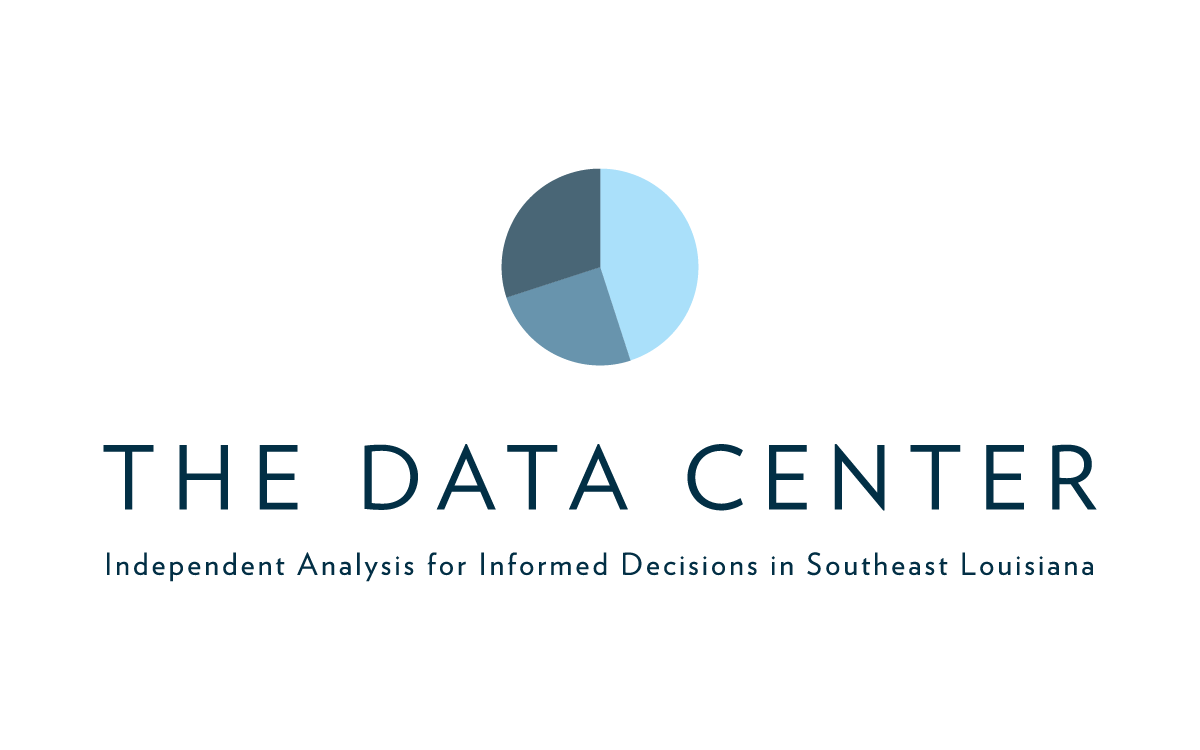

The Data Center, a fully independent and neutral nonprofit, is the most trusted resource for data about Southeast Louisiana. Founded in 1997, we are experts at bringing together and communicating data from multiple sources. In doing so, we look beyond common anecdotes to provide rigorous, research informed, and data-based analysis on issues that matter most to government, business, nonprofit, and community leaders in our region. In these ways, The Data Center realizes its mission to build prosperous, inclusive, and sustainable communities by making informed decisions possible.
The Data Center approaches its work from three levels:
The Data Center’s areas of expertise include disaster recovery, regional economic analysis, workforce development, racial disparity indicators, blight reduction, affordable housing, and coastal population movements. Regardless of the subject area, The Data Center brings together data from multiple sources in a way that connects the dots beyond simply a public or private sector perspective.
The Data Center believes that reliable data, analyzed by an independent team of experts that know New Orleans and Southeast Louisiana, makes good decisionmaking possible. Our work provides a tool box of fact–driven, well–researched data that moves beyond anecdotal experiences and goes deeper than national reports which, too often, miss community nuances that are unique to our region and key to understanding the root causes of our challenges. A core part of The Data Center’s mission is to transform local culture from being data–adverse to embracing data as an intrinsic component of sound policy development. This transformation gained steam significantly after Hurricane Katrina when The Data Center created “The New Orleans Index” to measure key indicators towards recovery.
The Data Center compiles, monitors, and analyzes data each and every day. We put our work in the hands of local and national stakeholders in the following ways:
The Data Center serves everyone who needs data to do their work. This includes government agencies, business leaders, neighborhood associations, local nonprofits, and members of the media. We distribute our data across a range of channels, including our website (100,000 unique visitors/year), our e–newsletter (4,000 subscribers), the media (500+ mentions/year), print publications, speaking engagements, and decisionmaker briefings. By doing so, The Data Center helps inform a common understanding of progress and challenges in key areas of interest. This understanding, in turn, can lay a solid foundation for sustainable progress towards a prosperous and inclusive region.
By keeping facts on the table, The Data Center regularly gives local, regional, and national leaders the tools they need to make the strategic, programmatic, and fiscal decisions that are building a sustainable New Orleans and Southeast Louisiana.
Let The Data Center help you make informed decisions! Sign–up for our “Numbers Talk” e–newsletter so that you are alerted whenever The Data Center publishes new data and reports.
The Data Center was founded to introduce well–researched, objective data into local conversations about New Orleans’ future. The Greater New Orleans Community Data Center began in 1997 with a research grant from Baptist Community Ministries to Tulane University. In 1999, the project was transferred to the United Way who acted as the fiscal agent when The Data Center began working to expand the ability of the local nonprofit community to access and strategically use local information in decisionmaking and grant writing.
In our early days, we spent countless hours not only researching and analyzing, but also meeting with community leaders about the importance of good data. Many were skeptical about both the need and the ability to bring data into decisionmaking processes that, historically, were based more on relationships, anecdotes, and longevity than data. Then Hurricane Katrina hit and everyone was scrambling for data — any data — that would measure not only what happened, but also how New Orleans could come back. Working with the Brookings Institution, The Data Center became the local authority for tracking post–Katrina recovery with our now biennial “New Orleans Index.”
In 2005, The Data Center saw an opportunity to deepen our impact on area nonprofits and merged with The Center for Nonprofit Resources. [The Center for Nonprofit Resources began in 1992 as a department of the United Way for the Greater New Orleans Area and was formed to provide full–service management support to local nonprofits. In 1997 The Center for Nonprofit Resources became an independent 501(c)(3) whose mission was to serve as the hub of services and support for nonprofit organizations in the greater New Orleans area.] Nonprofit Knowledge Works was born with a mission to help area nonprofits create evidence–based operational cultures. Nonprofit Knowledge Works success stories can be found throughout greater New Orleans, most recently with the turnaround of the previously troubled Metropolitan Human Services District.
As a learning organization, Nonprofit Knowledge Works is always looking at its own data within the context of local, regional, and national trends. What we see today is an environment with limited funding and many needs. In this environment, we believe the most pressing need is to get good, understandable data into as many hands as possible. For this reason, effective July 1, 2013, we returned to our roots to, at least for the time being, concentrate solely on being The Data Center.
Nonprofit Knowledge Works is a 501(c)(3) organization and is the parent organization of The Data Center. Click here to access our Form 990 on Guidestar.